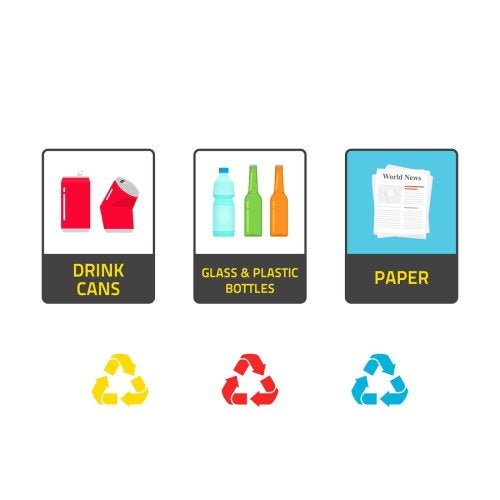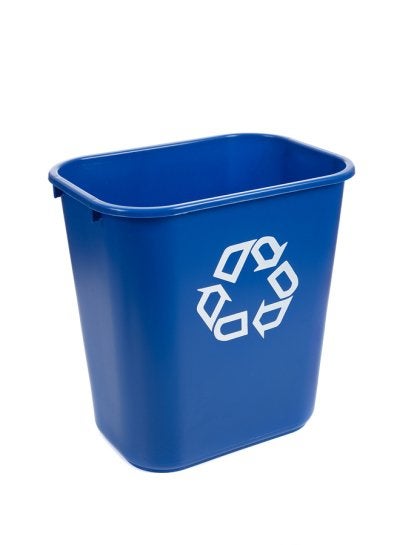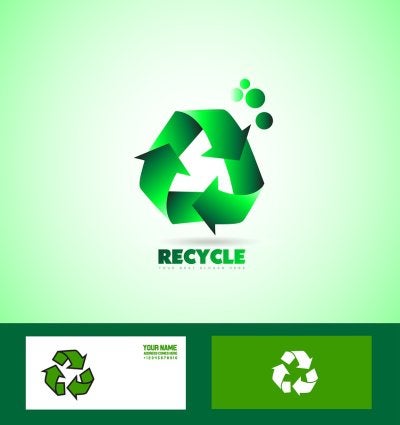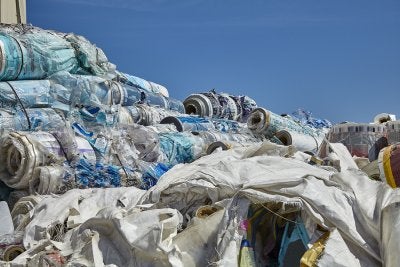-
Understanding Paper Recycling
If you have recently implemented a recycling program for your company, you may be interested in learning more about paper recycling in Atlanta . Any paper waste that your company generates can be collected in recycling bins, picked up by your waste management company during your regular trash pickup, and sent to your local recycling center. This paper is then sorted, cleaned, and graded at the recycling center, and is then sent to a paper mill.
Watch this video to learn more about the paper recycling process. After recyclable paper is sent to a paper mill, it is turned into pulp, and any non-recyclable elements, such as staples, are removed. It may then be bleached. Recycled paper may be turned back into cardboard, paper, glass, cans, food and drink cartons, plastic bottles, or clear sacks.
-
What Happens to Recycled Materials
Recycling is an innovative process that transforms used and discarded objects into useful materials. This video will provide you with a behind the scenes look at what happens to your recycled materials after they leave your home or office. After a recycling truck collects your bin, it will bring the materials to a sorting facility. Next, paper, plastics, and glass are separated by type. If you plan to recycle near Atlanta, it is important to learn about how recyclables should be sorted before they are picked up.
A thorough waste disposal plan can easily integrate recycling into your daily business operations. If you are wondering about how you can get the most out of your recycling, do not hesitate to get ahold of a waste disposal company in your area. Your team can help you cut back on your waste while also saving you money.
-
Essential Elements of Commercial Waste Management
Streamlining your commercial waste management practices can be a highly effective strategy for improving the profitability and sustainability of your business. With services from a company that specializes in waste management and recycling serving Atlanta , you will be able to determine which disposal methods will be best for your business. To ensure that your waste management provides your business with the best functionality, you will want to incorporate several essential elements.
Dumpsters, trash cans, and recycling bins are three essential commercial waste management tools. Trash cans are among the most important elements of a commercial waste management plan. Strategically placed trash cans can help you make sure that your employees and clients are throwing away their trash in the proper containers. Along with placing plenty of trash cans around your facility, you may also want to include recycling bins in your plan. At the end of the business day, a dumpster can be used to collect and house bulk amounts waste until it can be picked up.

-
Spotlight on Sustainability
Sustainability is a key concern for many of today’s business. When you are researching sustainable practices for your company, you may want to take the time to gather information about waste management and recycling. By updating your trash removal practices with help from a company offering recycling bins in Atlanta , you will feel great knowing that your business is operating in a sustainable and environmentally friendly fashion.
There are several ways that recycling can boost your sustainability. A recycled item will be reused for a new purpose, thereby helping to reduce the carbon emissions and consumption of natural resources that are associated with creating products from all new materials. Recycling can also cut back on the amount of debris and waste that you are tossing in your dumpster. Implementing a recycling program can also place sustainability at the forefront of your business identity. A recycling center can provide you with additional information about the sustainable benefits of recycling.

-
How to Identify the Recyclable Items in Your Workplace
Workplace recycling programs are a simple and effective way to reduce a company’s waste generation and carbon footprint. It’s common for people to want to do their part and recycle near Atlanta but, in many cases, they aren’t certain about what materials are supposed to go in the recycling bins .
The first step in identifying what items in your workplace are recyclable is to take a closer look at the recycling bins. Many establishments post a guide either on or near the bin to help employees recycle effectively. Also, pay attention to the color of the bin. Your workplace may have separate bins for compost, metal, cardboard, paper, or plastic recycling.
If your recycling bins offer no guidance about what should go inside of them, speak with an employee who works with the recycling program or contact the company that handles the recycling for your workplace. Some of the most common recyclable materials you might find yourself disposing of are paper, cardboard boxes, plastic bottles, aluminum cans, and plastic containers.

-
Answering Questions About Electronics Recycling
While many products and materials can be recycled, not all are processed in the same way, so it is common for people to be unsure about what they can toss into their recycling bins in Atlanta. When it comes to recycling electronics, also called e-waste, people often have plenty of questions:

Can I recycle my old electronics?
You can recycle electronics. Because it is important to dispose of electronics appropriately, rather than simply throwing them in the trash, you should always recycle your electronics. Companies that accept e-waste materials have the resources and equipment necessary to safely disassemble your discarded electronics. You can also consider selling or donating your old devices if you dislike the idea of them being broken down for parts.
Why shouldn’t I throw my electronics in the garbage?
There are a few reasons why you shouldn’t toss your old electronics away with the rest of your trash. First, they may hold personal information that could put your identity at risk. Second, many e-waste materials contain toxic substances, such as mercury, lead, and cadmium, which require particular waste disposal methods to be handled safely. When sent to the landfill, electronics can leak these toxins, which may harm local wildlife or contaminate food and water sources.
Can I put my old electronics in blue recycling bins?
The answer to this question depends on the particular recycling program in which you participate. Contact your recycling service provider to learn more about what can and can’t go in your blue bin. Some companies accept everything from circuit boards and cell phones to flat screens and fax machines.
What is the easiest way to properly dispose of electronics?
If your recycling service does not accept e-waste, contact your local electronics store instead. Most major electronics manufacturers and retailers offer in-store and event recycling programs, and some will even haul away your old televisions and computers. You can refer to the EPA’s website for more information about companies that participate in the Sustainable Materials Management program.
-
Training Employees on Your Company’s Recycling Policy
A company-wide recycling policy is a smart decision for lots of reasons. For example, depending on the industry you work in and the nature of the products or services you provide, recycling can help reduce your raw material expenses. A recycling policy is also good for employee morale and can even help with your organization’s outward facing brand identity. When you partner with a waste management and recycling company in Atlanta , coming up with a company-wide recycling policy is easy—it’s implementing the policy that can be a struggle. To help get everyone the same page as quickly as possible, here are some tips for training employees on your company’s new recycling policy.

Assign a Recycling Coordinator
To help implement your new recycling policy, assign a dedicated recycling coordinator or appoint recycling “supervisors” in each department. Whoever is in charge, this person (or these people) will be the go-to when anyone has questions or concerns about recycling at work. Recycling supervisors should also be in charge of educating the rest of your workforce regarding best recycling practices.
Hold a Kick-Off Event
Another way to help get your workforce onboard and excited about recycling is to throw a kick-off event where you introduce the new recycling policy, talk about the benefits of recycling, and explain how it will benefit the company and as a result benefit the employees. Make this event fun so your employees leave feeling excited and energetic about recycling instead of just another boring workplace policy they need to follow.
Recognize Employees for Their Efforts
As your employees get used to the new recycling policy, recognize those employees who have bought in and are making efforts to ensure the recycling policy is successful. This will reinforce good recycling habits and encourage other employees to think about ways they can do better at recycling.
-
Eco-Friendly Practices for Industrial Sites
Industrial facilities are at the heart of America’s manufacturing capabilities, but it’s also true that these sites can have a greater toll on the environment than other types of operations and practices. Fortunately, there are some significant benefits to adopting eco-friendly practices that can justify and even accelerate your facility’s commitment to going green. For example, a more profitable operation is the number one reason why industrial facilities decide to adopt more eco-friendly practices. An industrial waste management company in Atlanta can help you connect the dots and make the shift, but in the meantime here are some things you can do to benefit the environment and your bottom line at the same time.

Make the Commitment to “Go Green”
The first and most important eco-friendly practice is simply the commitment to go green at an operational and organizational level. Instituting a company-wide recycling policy and educating employees and stakeholders about the importance of being eco-conscious is the first step towards real changes in your industrial site that benefit the environment.
Improve Facility Energy Efficiency
Although it’s certainly easier said than done, improving your facility’s energy efficiency is one of the best things you can do for the environment and your bottom line. If you get stakeholder buy-in and are committed to reducing your carbon footprint (and your energy costs) look for opportunities to improve energy efficiency by replacing old equipment, performing an energy audit, and other efficiency-improving practices. The Alliance to Save Energy has some tips for boosting the energy performance of your industrial facility .
Reduce, Reuse, and Recycle
The “3 R’s” have been preached and practiced for decades, but it doesn’t mean you can’t benefit from reducing, reusing, and recycling. These practices can lower the amount of energy you consume as well as the amount of materials you purchase, which can save you considerable amounts. A waste management company that offers waste analytics can help you identify areas where recycling can help.
-
A Look at Trends in Green Technologies
Today’s technological innovations are designed to conserve energy and natural resources. With green technology, you can help your business generate less waste, while also saving on the costs of energy and other resources. Some of the most amazing green technologies that have been released in current years include LED lightbulbs and personal solar charging devices. If you would like to boost the environmental impact of your business, you may want to consider asking your local recycling center about how you can better use your recycling bins. When you recycle, you will be doing your part to protect the environment. A company specializing in recycling bins in Atlanta can help you create a recycling program for your business. To tour some of the top trends in green technologies, check out this video from TheRichest.
-
Why Recycling Benefits Small Businesses
Recycling is a top priority for many small businesses around the world. By implementing a recycling program for your small business, you will be able to reduce your waste, while also providing you with cost savings. In fact, picking up recycling bins is typically offered at a lower cost than junk removal or other services. With proper cardboard recycling and other recycling measures, you can dramatically cut down on your overall waste management costs. A company that offers recycling serving Atlanta can provide you with more information about the benefits of recycling. To learn more about how recycling benefits small businesses, check out this video.
RECENT POSTS
categories
- Uncategorized
- Waste Management Atlanta
- Waste Disposal and Recycling
- Hazardous Waste Disposal
- Chemical waste removal
- solid waste removal
- R3 Program
- Sustainable Organizations
- Sustainable Waste Removal
- Commercial Waste Removal
- Materials Management Program
- Dumpster Rental
- Roll Off Dumpsters
- Construction Site Waste Removal
- Sustainability
- Recycling in Atlanta
- Industrial Recycling
- Industrial Waste Removal Services
- Southern Waste & Recycling
- Waste Removal Atlanta
- Waste Specialists
- Atlanta
- Infographic
- Front Load Dumpsters
- Rear Load Dumpsters
- Reusable Electronics
- Dump Truck Atlanta
- Recyclable Electronics
- Trash Compactors
- Recycling
- Recycling Program
- Office Recycling
- Metal Recycle
- Electronic Waste
